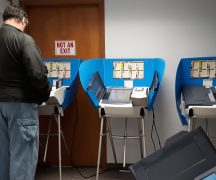By DAVID DUPONT
BG Independent News
Even before the TV networks decided to color code the national partisan divide, Wood County and the legislative districts it is part of have been deep red.
It’s been 80 years since Democrat represented the 5thCongressional District in Congress.
A slate of legislative Democrats is hoping that this will be the year to redecorate the district with a new political color scheme. The candidates are: Nick Rubando, running for the U.S. House in the 5th District, Joel O’Dorisio for Ohio Senate District 2, and Laurel Johnson, Ohio House in District 3. All three are facing incumbent Republicans – U.S. Rep. Bob Latta in Rubando’s case, State Sen. Theresa Gavarone, and House Rep. Haraz Ghanbari.
“There’s a lot of things that are making a different year,” O’Dorisio said. “I know we have a long history of voting for the Republican candidates. But the (state senate) district itself has gone for Obama twice and for Sherrod Brown twice.” The district is “almost a pivot district.”
While the Republicans have a significant edge in registration 65,000 to the 40,000 registered Democrats, there are more unaffiliated voters, 133,000, than both combined.
O’Dorisio believes the party has a message that can reach those unaffiliated voters, and there are conditions that make this year more promising for Democrats.
Rubando faces an even tougher challenge. U.S. House district is even redder than the county and the state senate district.
“First and foremost,” Rubando said, “we’re going to get a lot of help from the top of ticket.” Biden, he said, is leading in the polls.
“His working-class message attracts a lot of Trump voters. When you look at the polls, you see a lot of white working class and older voters are the ones gravitating toward Biden’s message, and those are the individuals in this district and that’s going to help us a lot.”
Johnson, who grew up in a working-class family in Wood County, said: “Ohio deserves government that’s representative of all Ohioans, particularly the working class. There need to be more people in Columbus who know what it is to struggle.”
She added: “The COVID-19 pandemic has put an unprecedented strain on our social safety net, and it’s highlighted the fact that we haven’t invested enough in our communities. The Republican culture of corruption at the Statehouse has eroded the sense of public trust and is making this pandemic so much harder.”
People are facing eviction, the loss of health insurance, the need for child care. “It’ s a very multilayered problem. I don’t see an easy solution,” she said.
Rubando has been hosting drive through food banks as a way of addressing that issue, as well as finding a novel way to reach out to voters in a time when so many other avenues are closed off.
That makes the digital realm all the more important, Johnson said.
“Political scientists are going to be studying this election for years to come, said Mike Zickar, who chairs the Wood County Democratic Party. “The Democratic Party is going to campaign hard with your safety in mind.”
“It’s been a matter of shift in focus to the digital world,” Johnson said. “With campaigning as with everything, it is has become more virtual. Like we do in our daily lives, everything is done remotely. It’s been not being able to do door to door and talk to the voters. In that way, everyone is in same situation.”
Still she finds it concerning that the Trump Administration is opposing funds for the US Postal Service on the brink of an election where absentee voting will be more important than ever.
While the pandemic shuts down some methods of outreach, O’Dorisio said, it opens up new opportunities, both online where he’s joined other legislative candidates around the state to compare notes and in person where possible.
He and Rubando and Bruce Jeffers, who’s running for Wood County commissioner, attended a drive-through fundraiser at a constituent’s house that allowed face -to-face contact in a socially distanced manner.
That includes drive up food banks that Rubando has held. “They’ve really offered a great way to still socially distance but have people meet us and ask questions. With so many people unemployed and really struggling to put food on the table, we think it’s an amazing way to give back to our community.”
The pandemic isn’t the only challenge they face. All three are behind in fundraising, especially Rubando. Open Secrets shows that as of June 30, Latta had raised $1.1 million with $1 million still on hand. Rubando had raised just over $142,000, with $32,000 on hand.
According to transparencyusa.org, Gavarone has raised $264,000 to O’Dorisio’s $40,000. Ghanbari has raised $71,000 with Johnson raising just under $1,000.
“I’m not going lie,” O’Dorisio said. “It’s a problem. That situation is not an accident. As Democrats we represent people in the community not the 1 percent. We’re heavily reliant on small dollar donors.”
More than 350 people have contributed to his campaign.
Though he’s facing an incumbent, he’s not concerned about name recognition. This will be Gavarone’s first time running for senate. She was appointed in early 2019 to fill the vacancy created when Randy Gardner was appointed Chancellor of Higher Education. (Ghanbari was later appointed to fill the House vacancy.)
And O’Dorisio was helped by running in a very competitive primary against Ream Subei.
Ohio’s public funding of campaigns was eliminated. While it offered “a stable source of funding for Democratic candidates,” he said, Republicans didn’t need it given they were allegedly getting $61 million in illegal contributions through a scheme that eventually cost House Speaker Larry Householder his job and put him at the center of an FBI probe. The money was used, the FBI claims, to insure passage of House Bill 6, a bailout of First Energy’s nuclear plant, which also promoted coal power and scaled back state support for renewable energy sources.
Both Gavarone and Ghanbari supported the bill. One of the plants is in Ottawa County, part of the senate district.
O’Dorisio pointed that the Householder scandal is just the most recent in a line of Republican scandals. Previous House Speaker Cliff Rosenberg quit over a scandal involving the pay day loan industry. Before that the party was embroiled in charges that ECOT, which ran charter schools, had received tens of millions in taxpayer dollars for students who were not as engaged in learning as the school reported. Before that in 2005 was Coingate involving the state retirement system investing in rare coins through a business operated by Republican donor Tom Noe.
As a public employee – O’Dorisio is a teaching professor in BGSU’s School of Art – that scandal will continue to cost him money even after he’s retired, he said.
This comes from a political party holding super majorities in both chambers of the state legislature.
O’Dorisio said that joining with other candidates to share resources as a way of stretching their dollars. That includes having more than one candidate’s name listed on door-hangers, mailers, and fliers, and sharing volunteers who distribute those.
And, he said, they expect some boost from the Biden campaign. “I know they’ll be mentioning us in phone calls and get-out the vote efforts. … We’ll get help from the party to the extent available.”
And it helps the Democrats have a strong local ticket with himself, Rubando, Johnson, and Jeffers.
Rubando said that in 2018 when a blue wave swept over the country, Democrats were disappointed, aside from U.S. Sen. Sherrod Brown’s win, with how the election turned out in Ohio. “A lot of people have written Ohio off,” he said. “I realize if we want to win have to run a strong campaign everywhere. The strength of the campaign is we have people who are incredibly dedicated to this cause.”





